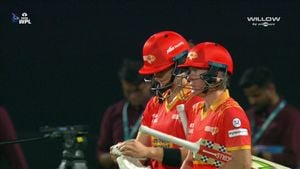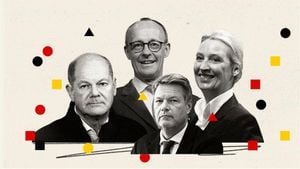Recent developments in Iran's economy and political climate reflect significant challenges and transitions faced by its government and citizens. Despite rigorous sanctions and rising inflation, the Iranian government is exploring initiatives to stabilize the economy and address its public grievances.
One of the primary events underscoring these economic troubles was the Iranian parliament's recent approval of empowerment legislation aimed at significant fiscal reforms. With these measures, President Ebrahim Raisi's administration seeks to tackle the soaring inflation rates, which have reportedly exceeded 40% over the past year. This legislative maneuver came just as public dissent aimed at the government intensified due to deteriorated living conditions.
According to state media, the parliament, known as the Majles, ratified the budget amendments to boost state revenue and curb the impact of international sanctions. Measures included revising tax structures and encouraging foreign investments, which some economists view with skepticism, questioning whether these strategies will be effective within the smothering sanctions.
The social fabric of the nation is also under scrutiny as public protests erupt sporadically, largely driven by economic hardships. Reports suggest the tension is rising particularly among the youth and middle class, who face diminishing job prospects and purchasing power. The protests are not just concentrated on economic issues but have also transcended to frustrations with political repressiveness and calls for democratic reforms.
People like Amir, a young professional from Tehran, articulated widespread frustration in the streets, stating, "We demand change, and we won't stop until we see it." This sentiment echoes throughout the populace, which feels increasingly disconnected from the decisions made by their leaders. Critics argue the government's response to protests has often leaned toward suppression, with increased crackdowns evident following public demonstrations.
Regionally, Iran's relationships remain complicated. Diplomatic ties have seemingly soured, particularly with the West, following the 2015 nuclear deal's unraveling. Washington's restoration of economic sanctions has forced Iran to pivot toward alliances with countries like China and Russia, seeking to deepen trade links and economic partnerships. The Iranian leadership asserts confidence, claiming systemic reforms will alleviate pressures but faces mounting skepticism internationally.
On the global front, Iran’s role remains pivotal, particularly concerning energy supplies. Despite sanctions, the country's oil production has seen slight fluctuations but continues to underperform relative to its capacity. The International Energy Agency reported Iran was producing about 3 million barrels per day, down from pre-2018 figures, with major state oil negotiations struggling under tightening sanctions.
While the government touts developments such as the expansion of rail networks and industrial projects, critics question the efficacy of these projects amid widespread theft, corruption, and mismanagement within various state ministries.
Addressing international observers, Iranian Foreign Minister Hossein Amir-Abdollahian has attempted to assure nations about Iran’s commitments to re-engagement talks. His recent statements highlight Iran’s willingness to discuss nuclear protocols without relinquishing its sovereignty. "Our goal is to secure the position of Iran at the negotiating table, ensuring our rights are not sacrificed," he stated during a recent conference.
Complicatory factors emerge through Iran's internal political divisions as hardliners clash with reformists inside the parliament. The negotiation strategies employed by the government reveal fractures within its own ranks. Some parliament members have criticized the administration's soft stance toward the West, advocating for stricter measures against those perceived as compromising national interests.
The Iranian judiciary remains vigilant over public dissent, employing significant funding and resources to suppress opposition movements, characterizing them as threats to national security. Human rights organizations call for accountability, urging international intervention as data emerges on abuses conducted by Iranian security forces.
Within this complex milieu, the role of Iran's youth emerges as pivotal toward shaping future protests and perhaps the broader political discourse. Educational institutions have become hotbeds for activism as students demand more than mere economic stability, seeking fundamental reforms and transparency from their government.
International leaders continue to watch these developments closely. Iran's strategic significance, alongside its untapped natural resources, poses challenges and opportunities for cooperation. It raises pivotal questions about sustainable economic growth and political stability. Foreign investment and positive diplomatic engagements remain entangled with Iran's nuclear ambitions and foreign relations.
Despite these numerous challenges, President Raisi's government has initiated outreach programs aimed at amelioration of social inequity. Citizens are hopeful but cautious, aware of the historical inconsistencies between state promises and actual outcomes.
The current political and economic climate calls for agility within Iranian leadership as it navigates through public expectations and international pressures. This balancing act will be the real test of the government’s capability to deliver on promises and implement sustainable change, especially concerning the country’s largely youthful demographic, who demand more than just economic survival.



